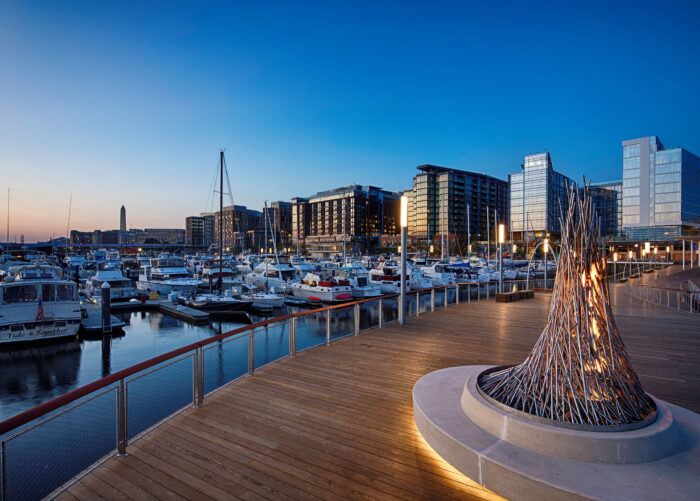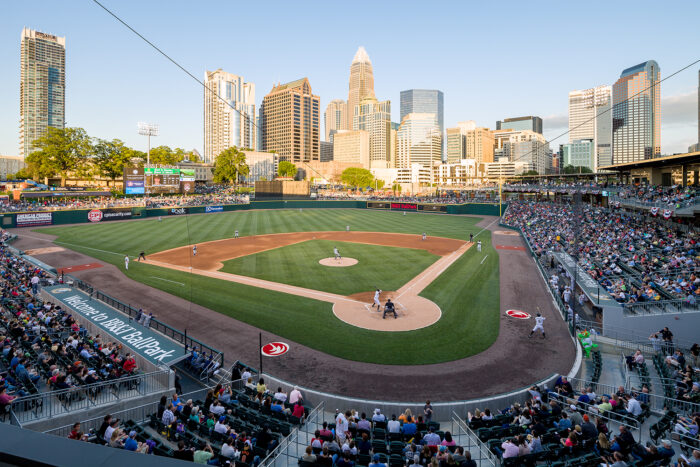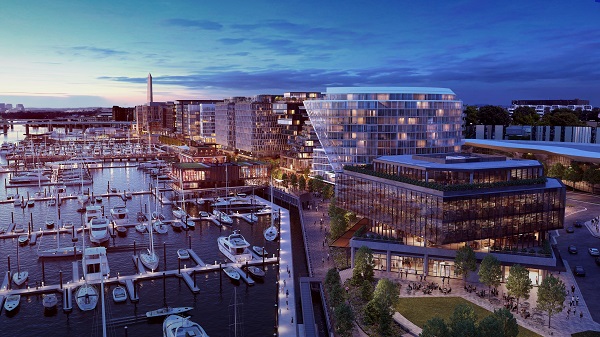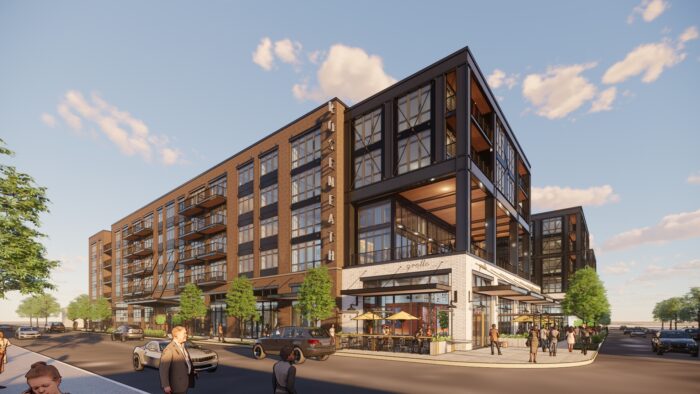
Capital Square’s Diamond District team includes Hoffman & Associates, which developed The Wharf mixed-use development in D.C. (Images courtesy Capital Square)
As part of a team that includes three out-of-town peers, a newer player in Richmond’s development scene is swinging for a grand slam with its bid for the city’s Diamond District project.
Capital Square, the local real estate investment firm that’s made moves in recent years into development in the nearby Scott’s Addition neighborhood, is among four developers behind Diamond District Gateway Partners, one of six teams that remain in contention for the 67-acre mixed-use redevelopment that’s to include a replacement of The Diamond baseball stadium.
Joining Capital Square are D.C.-based developers Dantes Partners and Hoffman & Associates, and Maryland-based developer The Velocity Cos.
Hoffman’s portfolio includes The Wharf, a mixed-use development on D.C.’s Southwest Waterfront. Dantes focuses on income-based housing and is currently developing Pin Oaks Estates, a 98-unit apartment complex in Petersburg. Velocity is developing a minor-league stadium in North Carolina for the Gastonia Honey Hunters, which is owned by Velocity’s CEO.
Also on the team are Richmond-based Baskervill and fellow architecture firm Pendulum, which focuses on sports venue design; engineering firms VHB and Richmond-based Froehling & Robertson; and general contractors Clancy & Theys and Barton Malow, the latter of which has built dozens of pro baseball stadiums and has an office in Richmond.

Team member Barton Malow’s stadium construction credits include the Charlotte Knights’ Truist Field in North Carolina.
Capital Square, led by founder and CEO Louis Rogers, assembled the team in anticipation of the city’s solicitation for the Diamond District last fall, said Natalie Mason, the company’s senior vice president for development. Mason said the team includes additional members that they’re not announcing yet.
“We built the team with some national-level thought-leaders to bring really special design to the master planning process,” Mason said. “We’re not going to disclose who they are at this point, but they include someone who has really deep experience in stadium design and operations and has worked on many of the baseball stadiums that we know and love, like Camden Yards, Fenway Park and Dodgers Stadium.”
Mason referred to two firms that she said are both woman-owned, the other with a focus on placemaking and retail strategy.
Mason also noted diversity in the team’s makeup, with several minority-owned firms including Dantes, Velocity, Pendulum and Froehling & Robertson. Minority business involvement is encouraged in the city’s solicitation for the project.
“We started early on being really thoughtful on what it would take to execute on this scale of an urban development project with the added complexity of the stadium,” Mason said. Noting the team’s mix of national firms and local companies, she added, “We felt like that was a perfect combination. We’re hopeful that the city agrees with us.”
The city is looking for one or more teams to collaborate with on redeveloping the site that’s been floated for redevelopment in starts and stops for over a decade. Driving this latest effort in large part is a deadline set by Major League Baseball for all pro baseball venues to meet new facility standards by the start of the 2025 season. The Richmond Flying Squirrels has been promised a new ballpark since the Double-A club’s arrival in 2010.
Deemed unfeasible for renovation, the 37-year-old Diamond would be replaced with a new 10,000-capacity stadium that would anchor the larger mixed-use development. The city’s solicitation calls for office, residential, retail, a hotel and infrastructure upgrades. The residential component would consist of rental and for-sale homes targeted to a mix of income levels.
The six teams that made the cut from an earlier round in the process were asked to provide additional information about themselves and their approach to the project. Those details are due this Monday, April 25.
An evaluation panel would then review the information and select a shortlist of finalists, who would be invited to submit proposals by early June. A final selection is targeted later that month.
Mason said their team’s name – Diamond District Gateway Partners – reflects its approach and vision for the project.
“We view this as an opportunity to be a true gateway into the city,” she said. “We definitely envision that this project will create housing, employment and entertainment opportunities for all Richmonders.”
Mason said Capital Square got the ball rolling for its team, meeting informally last fall with neighborhood groups and other stakeholders about the project. She said the firm reached out to Hoffman & Associates, which in turn brought in Dantes Partners and came with its experience in developing The Wharf.
“The Wharf is really a national example of urban mixed-use development, so we feel Hoffman brings a great deal of not only vision of what could be done at Diamond District but also execution experience. We were really excited that they wanted to join the team,” Mason said.
Based in D.C. and active in Virginia, Dantes has developed nearly 2,500 lower-income housing units totaling over $1 billion in value, according to Mason, who described the firm as “really creative on the financing side for affordable housing.”
Mason said Velocity was brought in through discussions with people in the baseball industry. She noted CEO Brandon Bellamy’s dual perspective not only developing a minor-league stadium but also as the Honey Hunters’ owner – the only black pro baseball owner in the country when he purchased the team in 2020, according to reports.
“He has tremendous insight into and appreciation for what it takes to deliver a thriving multipurpose stadium, which is what we understand that the city would really love to see at The Diamond.”
Mason also highlighted Pendulum founder Jonathan O’Neil Cole, whose design credits include the minor-league Dunkin’ Donuts Park stadium in Hartford, Connecticut, CaroMont Health Park in Gastonia, and CoolToday Park in North Port, Florida.
“He’s a big believer in baseball stadium design needing to be situated at the heart of urban master planning and urban mixed-use development. If there’s anyone who can make a stadium feature prominently but also enhance the surrounding area, I think Jonathan O’Neil Cole is the person to do that,” she said.
As for Capital Square’s role on the team, Mason said the company brings local insight and expertise with over 2,500 residential units developed in the Richmond area, 550 delivered or under construction in Scott’s Addition specifically and another 350 units in the pipeline.
“We certainly view ourselves as the local player,” Mason said. “At the same time, we have a national capital raising platform. We raise capital all over the country for acquisitions and development in many markets across the country, so we view ourselves as being the capital partner and creating the capitalization strategy.
“We very much view the Diamond District as a once-in-a-generation opportunity for Richmond to create this new and vibrant community,” she added. “We think it’s important that it both enhances the established adjacent neighborhoods but that it also creates this focal point for civic pride in the entire city and the region, and that it really draws and attracts people through this part of the city.”
The other five teams that remain in contention are:
Richmond Community Development Partners, consisting of Houston-based Machete Group, developers JMA Ventures and Sterling Project Development, construction firm Gilbane, hotel management and advisory firm Retro Hospitality, architecture firm Hanbury, engineering firm VHB and planning nonprofit Storefront for Community Design.
MAG Partners, a New York City-based developer working with Seattle-based developer MacFarlane Partners, D.C.-based developer Jair Lynch Real Estate Partners, real estate investment firm MSquared, architecture firms AtelierTek and Woods Bagot, engineering firms Kimley-Horn and Thornton Tomasetti, sports venue developer CAA Icon, and placemaking and workforce firm C Space.
RVA Diamond Partners, team members unknown.
Vision300 Partners LLC, including developers Freehold Communities, Greenstone Properties, KDC and Spy Rock Real Estate Group; local building firm Hourigan; housing nonprofit Better Housing Coalition, construction firm Canterbury Enterprises, Shamin Hotels, YMCA of Greater Richmond, Brookfield Asset Management, and Richmond-based Sports United Ltd.
Weller Development Co. and LMXD, consisting of Weller, a Baltimore-based developer, and LMXD, affiliated with New York-based L+M Development Partners.
Correction: The Vision300 team membership has been updated to include lead developer Freehold Communities and Sports United Ltd., a Richmond-based sports group. Earlier reporting incorrectly identified a different Sports United group.

Capital Square’s Diamond District team includes Hoffman & Associates, which developed The Wharf mixed-use development in D.C. (Images courtesy Capital Square)
As part of a team that includes three out-of-town peers, a newer player in Richmond’s development scene is swinging for a grand slam with its bid for the city’s Diamond District project.
Capital Square, the local real estate investment firm that’s made moves in recent years into development in the nearby Scott’s Addition neighborhood, is among four developers behind Diamond District Gateway Partners, one of six teams that remain in contention for the 67-acre mixed-use redevelopment that’s to include a replacement of The Diamond baseball stadium.
Joining Capital Square are D.C.-based developers Dantes Partners and Hoffman & Associates, and Maryland-based developer The Velocity Cos.
Hoffman’s portfolio includes The Wharf, a mixed-use development on D.C.’s Southwest Waterfront. Dantes focuses on income-based housing and is currently developing Pin Oaks Estates, a 98-unit apartment complex in Petersburg. Velocity is developing a minor-league stadium in North Carolina for the Gastonia Honey Hunters, which is owned by Velocity’s CEO.
Also on the team are Richmond-based Baskervill and fellow architecture firm Pendulum, which focuses on sports venue design; engineering firms VHB and Richmond-based Froehling & Robertson; and general contractors Clancy & Theys and Barton Malow, the latter of which has built dozens of pro baseball stadiums and has an office in Richmond.

Team member Barton Malow’s stadium construction credits include the Charlotte Knights’ Truist Field in North Carolina.
Capital Square, led by founder and CEO Louis Rogers, assembled the team in anticipation of the city’s solicitation for the Diamond District last fall, said Natalie Mason, the company’s senior vice president for development. Mason said the team includes additional members that they’re not announcing yet.
“We built the team with some national-level thought-leaders to bring really special design to the master planning process,” Mason said. “We’re not going to disclose who they are at this point, but they include someone who has really deep experience in stadium design and operations and has worked on many of the baseball stadiums that we know and love, like Camden Yards, Fenway Park and Dodgers Stadium.”
Mason referred to two firms that she said are both woman-owned, the other with a focus on placemaking and retail strategy.
Mason also noted diversity in the team’s makeup, with several minority-owned firms including Dantes, Velocity, Pendulum and Froehling & Robertson. Minority business involvement is encouraged in the city’s solicitation for the project.
“We started early on being really thoughtful on what it would take to execute on this scale of an urban development project with the added complexity of the stadium,” Mason said. Noting the team’s mix of national firms and local companies, she added, “We felt like that was a perfect combination. We’re hopeful that the city agrees with us.”
The city is looking for one or more teams to collaborate with on redeveloping the site that’s been floated for redevelopment in starts and stops for over a decade. Driving this latest effort in large part is a deadline set by Major League Baseball for all pro baseball venues to meet new facility standards by the start of the 2025 season. The Richmond Flying Squirrels has been promised a new ballpark since the Double-A club’s arrival in 2010.
Deemed unfeasible for renovation, the 37-year-old Diamond would be replaced with a new 10,000-capacity stadium that would anchor the larger mixed-use development. The city’s solicitation calls for office, residential, retail, a hotel and infrastructure upgrades. The residential component would consist of rental and for-sale homes targeted to a mix of income levels.
The six teams that made the cut from an earlier round in the process were asked to provide additional information about themselves and their approach to the project. Those details are due this Monday, April 25.
An evaluation panel would then review the information and select a shortlist of finalists, who would be invited to submit proposals by early June. A final selection is targeted later that month.
Mason said their team’s name – Diamond District Gateway Partners – reflects its approach and vision for the project.
“We view this as an opportunity to be a true gateway into the city,” she said. “We definitely envision that this project will create housing, employment and entertainment opportunities for all Richmonders.”
Mason said Capital Square got the ball rolling for its team, meeting informally last fall with neighborhood groups and other stakeholders about the project. She said the firm reached out to Hoffman & Associates, which in turn brought in Dantes Partners and came with its experience in developing The Wharf.
“The Wharf is really a national example of urban mixed-use development, so we feel Hoffman brings a great deal of not only vision of what could be done at Diamond District but also execution experience. We were really excited that they wanted to join the team,” Mason said.
Based in D.C. and active in Virginia, Dantes has developed nearly 2,500 lower-income housing units totaling over $1 billion in value, according to Mason, who described the firm as “really creative on the financing side for affordable housing.”
Mason said Velocity was brought in through discussions with people in the baseball industry. She noted CEO Brandon Bellamy’s dual perspective not only developing a minor-league stadium but also as the Honey Hunters’ owner – the only black pro baseball owner in the country when he purchased the team in 2020, according to reports.
“He has tremendous insight into and appreciation for what it takes to deliver a thriving multipurpose stadium, which is what we understand that the city would really love to see at The Diamond.”
Mason also highlighted Pendulum founder Jonathan O’Neil Cole, whose design credits include the minor-league Dunkin’ Donuts Park stadium in Hartford, Connecticut, CaroMont Health Park in Gastonia, and CoolToday Park in North Port, Florida.
“He’s a big believer in baseball stadium design needing to be situated at the heart of urban master planning and urban mixed-use development. If there’s anyone who can make a stadium feature prominently but also enhance the surrounding area, I think Jonathan O’Neil Cole is the person to do that,” she said.
As for Capital Square’s role on the team, Mason said the company brings local insight and expertise with over 2,500 residential units developed in the Richmond area, 550 delivered or under construction in Scott’s Addition specifically and another 350 units in the pipeline.
“We certainly view ourselves as the local player,” Mason said. “At the same time, we have a national capital raising platform. We raise capital all over the country for acquisitions and development in many markets across the country, so we view ourselves as being the capital partner and creating the capitalization strategy.
“We very much view the Diamond District as a once-in-a-generation opportunity for Richmond to create this new and vibrant community,” she added. “We think it’s important that it both enhances the established adjacent neighborhoods but that it also creates this focal point for civic pride in the entire city and the region, and that it really draws and attracts people through this part of the city.”
The other five teams that remain in contention are:
Richmond Community Development Partners, consisting of Houston-based Machete Group, developers JMA Ventures and Sterling Project Development, construction firm Gilbane, hotel management and advisory firm Retro Hospitality, architecture firm Hanbury, engineering firm VHB and planning nonprofit Storefront for Community Design.
MAG Partners, a New York City-based developer working with Seattle-based developer MacFarlane Partners, D.C.-based developer Jair Lynch Real Estate Partners, real estate investment firm MSquared, architecture firms AtelierTek and Woods Bagot, engineering firms Kimley-Horn and Thornton Tomasetti, sports venue developer CAA Icon, and placemaking and workforce firm C Space.
RVA Diamond Partners, team members unknown.
Vision300 Partners LLC, including developers Freehold Communities, Greenstone Properties, KDC and Spy Rock Real Estate Group; local building firm Hourigan; housing nonprofit Better Housing Coalition, construction firm Canterbury Enterprises, Shamin Hotels, YMCA of Greater Richmond, Brookfield Asset Management, and Richmond-based Sports United Ltd.
Weller Development Co. and LMXD, consisting of Weller, a Baltimore-based developer, and LMXD, affiliated with New York-based L+M Development Partners.
Correction: The Vision300 team membership has been updated to include lead developer Freehold Communities and Sports United Ltd., a Richmond-based sports group. Earlier reporting incorrectly identified a different Sports United group.






It’s truly a shame that a new stadium for the Flying Squirrels wasn’t built sooner. It appears that a 10,000 seat stadium is now required rather than a 7500 seat stadium that could have been built earlier. The additional 2500 seat facility will add millions of dollars to the cost of the stadium, a cost that isn’t necessary since the Squirrels average approximately 6300-6400 fans per game. The exceptions are usually opening day and July 4th, and 5th.
The proposal that was before us ten years ago was to move the stadium location to the Bottom, a move to which you were opposed for all the right reasons. Now the proposal is to include it as part of a mixed use plan in the right location, one that will include thousands of new residents. Perhaps demographers have projected higher demand for seating at the games looking ten years ahead, twenty years ahead, as the region grows. The current numbers are that only 30% of the seats are taken by city residents, and that families from Chesterfield and Henrico… Read more »
I don’t really care who ends up getting the bid, I just want to see it done, and hopefully without the glut overpriced boxy monoliths like Capitol Square has scattered around Scott’s Addition. So sick of seeing DC/Nova’s oppressive brutalist structures taking over Richmond’s growing neighborhoods…
I get what you are saying, but they aren’t really Brutalist and that style that you are talking about (some kind of Postmodern, I guess — but I call it “Interesting by breaking up the monotony at least once” style of “okay” multifamily/mixed use.
As long as they stay out of places like the Fan, I am fine with it. If someone wants to build an interesting building some day, I guess they will.
There will come a time when someone will step out of the development box with a different style of apartment building than the ones we see today. The current cost of construction versus projected rents somewhat limits the choices that are financially capable in todays market. Efficiency looms large in design.
Brutalist is a very specific style, and there’s none of it in Richmond.
325 North Harrison. Pollak Building. Brutalist.
I’d never heard of Brutalist style buildings, so I did a quick search. Found a Style Magazine article describing some such buildings in Richmond built in 1960’s-70’s. I now know. I remember when some were built and recall having passed by them as well as entering some, I was never moved nor impressed with them visually and mostly passed by without hardly noticing they were there. Thanks for the brutal memories. lol.
Yea I don’t know what you’re talking about. There’s tons of brutalist architecture in Richmond. Not the ones this guy thinks, but they are most definitely around
Here’s the Style Weekly article as written by who else but our resident architect,Ed Slipek. There’s plenty in Richmond.
https://www.styleweekly.com/richmond/slab-city-richmonds-brutalist-buildings-and-what-they-represent/Content?oid=3494871
I studied architecture in school and this makes me laugh because you have no idea what brutalist architecture is